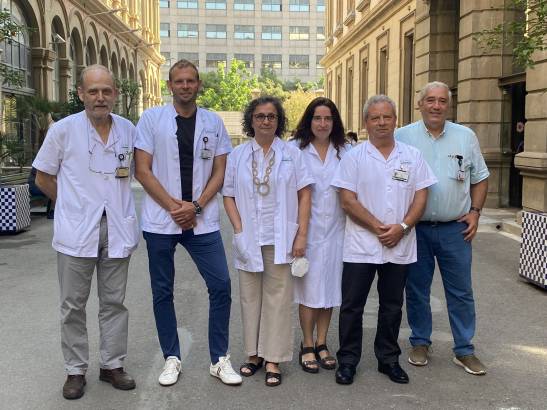O ASSISTS It is the most serious form of HIV infection. Thanks to advances in its treatment, today the disease has become chronic and the quality of life of infected people has improved. However, even if the antiretroviral treatment is effective in suppressing replication, the virus persists in reservoirs and recovers after discontinuation of therapy.
However, there are so-called after-treatment controllers, which keep undetectable viral loads without taking medicationbeing a realistic model for the functional care of the HIV. Other cases of cure are related to bone marrow transplantation or in rare patients who have defective viruses or genetic factors associated with a strong immune response to HIV from one type of lymphocyte, CD8+ T cellsin the so-called elite controllers.
Over the years, we found a pronounced and progressive drop in the number of viruses in the patient’s reservoir, which suggests control by the immune response.
Now, researchers from Hospital Clínic-IDIBAPS presented during the World AIDS Conference 2022 an exceptional case of functional cure of AIDS, in which, although the virus is not completely eliminated from the body, the immunity system of the host is able to control it without the need for drugs.
This is a patient who, after discontinuation of antiretroviral treatment, has absolute control of HIV replication, maintained for over 15 years, with an undetectable viral load without medication. Researchers from the University of Barcelona, the CIBER for Infectious Diseases (CIBERINFEC) and the Carlos III Health Institute also participated in the work.
“The case is exceptionalnot only because there are very few people with long-term aftercare control, but also because of the virus control enginedifferent from that described in elite controlling patients and in other cases documented so far”, he explains. Joseph MallolasIDIBAPS group leader and director of the Clinic’s HIV Unit.
For experts, this episode sheds new light on the mechanisms by which certain people can control the virus after antiretroviral therapy.
Furthermore, it opens the door to the development of new potential strategies of treatment to increase the activity of cells involved in the innate response against the virus.
A unique case: 15 years of control
The study describes the immunological mechanisms of the patient, post-treatment controller, which allowed her to maintain absolute control over the replication of the virus for more than 15 years. The woman was diagnosed at the stage of acute infection for HIV and was included in a clinical trial that prescribed two types of interventions: antiretroviral treatment for 9 months and multiple administrations of the immunosuppressant cyclosporine A (to improve the immune response).
“The patient did not have the classic genetic factors associated with HIV control and was not an elite controller of the disease”, he says. Josep M. MiroIDIBAPS group leader and specialist in infectious diseases of the Hospital Clinic.
Functional HIV cure is a much more realistic goal on a larger scale than cure sterilization, which is why understanding the underlying mechanisms is so important.
“Over these years, we have found a pronounced and progressive drop in the number of viruses in its reservoirwhich suggests a control by the immune response”, explains Sonsoles Sanchez-Palomino, researcher at IDIBAPS. On the other hand, the virus can be isolated and cultured in the laboratory, indicating that it was not ‘defective’.
The researchers found that in cultures in vitro their blood cells were highly resistant infected with HIV, but that their purified CD4+ T cells were susceptible to infection. This suggests that others cell populations of infection blocked by the blood and can help control the virus.
Through a test of viral inhibition, the study showed that there is a strong suppression of HIV promoted by two types of lymphocytes: ‘natural killer’ cells and CD8+ T lymphocytes. The first are part innate immune system and constitute the first line of defense against different pathogens; CD8+ T lymphocytes play a key role in the defense of cells against viruses and bacteria.
“The patient has very high levels of the two cells that can block HIV or destroy HIV cells. infected cells thus achieving functional care”, points out Nuria Climate, researcher at IDIBAPS. “The great novelty of this work is that we characterized the cells that manage to control the virus”, he adds.
“The functional cure of HIV is a much bigger goal. realist on a larger scale than sterilizing cure – that is, the complete removal of all replication-competent viruses in infected patients – which is why it is so important to understand the underlying mechanisms.” John AmbroseniDoctor at the Clinic and researcher at IDIBAPS.
